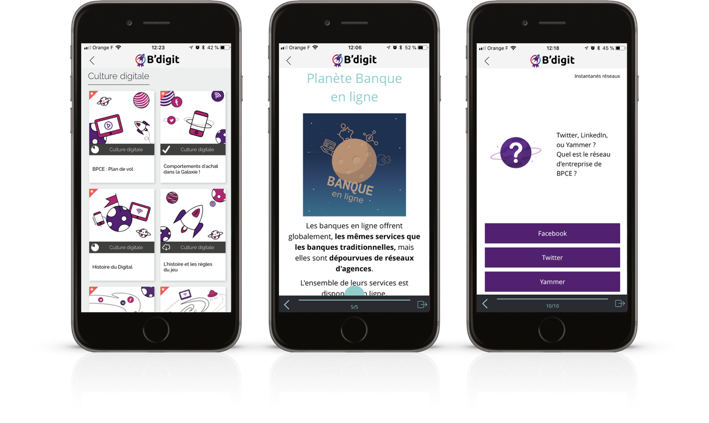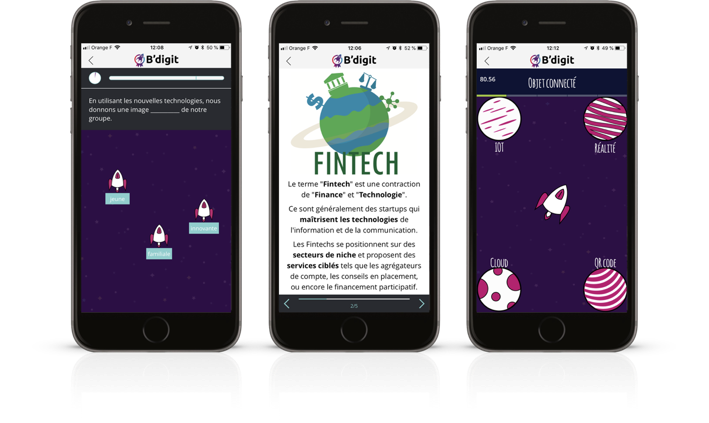Groupe BPCE has placed its digital transformation at the heart of its new strategic plan, TEC2020.
View video interviews with Marion ROUSO (Director of Digital Transformation and Employee Experience), Delphine COSTEDOAT (B’digit Project Officer) and David NATAF (IS Project Manager) from the Group, filmed during their visit to Teach on Mars on April 19 2018.
Driving digital culture for 106,000 Group employees
As part of its strategic development plan, Groupe BPCE Group has undertaken to make every one of its employees a contributor to its digital transformation. To support this ambitious aim, the scope of the B’digit application was quickly structured around three complementary axes:
- Reinforce and improve the digital culture of employees to help them understand the fundamental development trends in modern society (new consumer habits, GAFA, bitcoins, etc.) and appreciate their impact on the activities of the Group.
- Progressively familiarise staff with the new digital tools and services that are transforming and enriching the customer experience.
- Support Groupe BPCE’s in-house digital transformation by training staff in the use of new digital collaboration and productivity tools.
The B’digit application is designed to be used by all 106 000 employees of the group across its 40 entities. Using it is not compulsory, but incentives have been deployed to encourage staff to try out the new tool.
Integrating such a large target population into the new platform was child’s play, according to David Nataf, Delivery Manager for the B’digit project “thanks to a single sign-on system using an ADFS (1) identity federation solution that has been deployed within the Group for several years already. The B’digit, application consults this ADFS with the identification data supplied by the user. Once identification is validated by the ADFS, it sends an SAML (2) token authorising access to the application. This has made it possible to connect the entire group to the B’digit app quickly and seamlessly.”
A mobile learning project driven by the operational requirements of the field
“We carried out a survey with employees on the ground to find out what the real needs and expectations around the new application were,” states Marion Rouso, Director of Digital Transformation and Employee Experience for the Group, “People were talking about the need for flexibility in use, the need to integrate a microlearning approach, things like that. It became clear that Mobile Learning was going to be the most appropriate solution.”
Next came a formal Request for Proposals, culminating in a pitch session for short-listed potential partners before representatives of the different Group entities.” Teach on Mars emerged as the leader when it comes to mobile learning. Their solution is flexible while being powerful and comprehensive enough to meet all the requirements defined by the users. It enables us to produce customised content ourselves in-house, or to buy off-the-shelf learning resources if necessary. The format offered everything we were looking for: microlearning, gamification, “challenges” to encourage a community dynamic and interaction between employees.” Groupe BPCE also liked the way the new app could be customised in line with its visual identity – and with the space-themed graphic universe it had selected – and this was another factor that tipped the balance in the favour of Teach on Mars.
A revolutionary solution to set new paradigms
“Groupe BPCE already had a digital learning offer in place,” continues Marion. “There were e-learning courses, MOOCs and serious games, but nothing gave us the ‘Wow!’ effect we were looking for. That’s what we were able to deliver through the gamification of B’digit. We also wanted our employees to be able to use the app on all the devices they use in the course of their ultra-connected daily lives – computers, smartphones and tablets. Teach on Mars has enabled us to do that.”
Two-stage deployment process
October 2017 saw the organisation of a pilot targeting a sample population of 200 users across all 40 entities. Once this pilot had been pronounced conclusive, the deployment continued progressively across all group entities. By mid-April 2018, more than 13 000 Groupe BPCE staff had connected to B’digit, which was more than 30% of total staff in the 20 entities that had deployed the app up to that point. “Our primary objective was that learners complete the skills assessment,” recounts Delphine Costedoat, B’digit Project Officer, referring to a 60-question positioning quiz that had been developed to determine the “digital profile” of individual learners and recommend the training courses each of them should complete as a priority. “11 000 of the 13 000 employees connected have already done the quiz, so we’ve hit our first goal. The challenge now is to encourage learners to complete the training courses that have been recommended to them. Bearing in mind that the objective of the Group’s TEC2020 Strategic Plan is an ambitious one: 100% of group employees to be trained in digital culture by 2020!”.
In order make the adoption of B’digit as seamless as possible and get maximum impact from its launch, Delphine supports and coaches each entity individually, with a detailed action plan that is defined in collaboration with a local project manager in each case. Every entity gets a personalised communication kit, as well as specially designed materials to market the new mobile learning offer via a programme of automated newsletters which help to stir the curiosity of learners, counter any possible resistance and build a desire to try out the new tool. At the same time, the mobile learning training catalogue will be reinforced over time by the addition of new courses designed by the Group digital learning team and through learning content produced locally in the entities using the Teach on Mars mobile-native authoring tool.
Enthusiastic reception from the learners
“Our learners are basically delighted with B’digit. Everyone loves the simplicity, the gamified aspects and the competitive dimensions provided by the leaderboards. They particularly like the skills assessment, a new learning activity that was created specifically for our project,” continues Delphine.
Groupe BPCE staff are also fans of the flexibility and accessibility of the Teach on Mars solution. “Staff like the fact that they can access training via their office PC between meetings and appointments, but also via their smartphone when they’re out and about. The application lets them learn whenever and wherever they want, which is helping them develop a new mindset of taking responsibility for their own learning,” adds Delphine.
Tight collaboration between technical teams on both sides
Given the scale of the project and the sheer numbers of learners and entities involved, close coordination between the Group and Teach on Mars teams has been essential. David Nataf takes up the story once more: “Having a single point of contact for all technical aspects of the project is a real advantage. It makes everything so much easier and more fluid, especially with the weekly progress meeting that enables everyone to stay abreast of the various workstreams.”
One of David’s tasks has been to ensure that the new solution complies with the SLA (3) defining the requirements of the Group in terms of service quality, and that all security standards around access to the platform and data are met.
“When it came to deploying measures to comply with the new GDPR (4) legislation, Teach on Mars managed the challenge perfectly. We have regular meetings with our Teach on Mars technical correspondent and the data security teams on our side to make sure everything runs smoothly,” says David.
3 best practices for a successful mobile learning project, from Delphine Costedoat of Groupe BPCE :
- Invest all you can in learner communication: ” Mobile learning is still new and unfamiliar, so it’s essential to do all you can to encourage learners to connect to the new app and discover a whole new way to train and learn. It really is about “marketing” your new learning offer.”
- Support and coach your entity project managers through the deployment. “We can’t interact with the learners directly, so the local project managers are an essential link in the chain. We used frequent meetings and interactions with our local project contacts in each entity to smooth the deployment process and mobilise the learner populations.”
- Encourage best practice sharing: “We created a Yammer group to enable all our entity project managers to share best practices. Each project manager also created a customised communication kit for the local employees and shared it on Yammer. As deployments progressed, each new project manager was therefore able to benefit from the combined experience of the growing list of project managers who had already deployed.”
(2) Security assertion markup language; enables Single Sign-On or SSO via the web
(3) Service Level Agreement
(4) General Data Protection Regulation

Cornélia a enfilé sa tenue de cosmonaute en 2017. Après 5 années au service des clients de Teach on Mars en tant que Customer Success Manager, Cornélia prend une nouvelle trajectoire en pilotant les projets de communication & marketing, ses premiers amours, toujours avec l’ambition d’explorer la galaxie !





![[Mobile Learning Awards] Spotlight on IWC, winner of the Deployment Award, best practices guide](https://www.teachonmars.com/wp-content/uploads/2024/05/Visu_BestPracticesGuide3-400x250.png)
![[Mobile Learning Awards] Spotlight on Diptyque, winner of the Integrated Training Award, best practices guide.](https://www.teachonmars.com/wp-content/uploads/2024/04/visu_BestPracticesGuide2-400x250.png)
![[Mobile Learning Awards] Spotlight on Le Bon Marché, winner of the Native Training Award, best practice guide](https://www.teachonmars.com/wp-content/uploads/2024/03/Visu_BestPracticesGuide1-1-400x250.png)